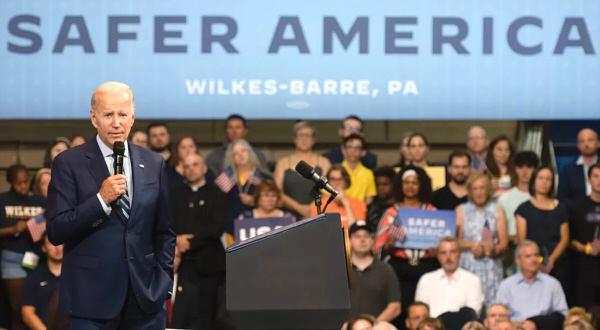

If You Want Fewer Shootings,
Ask Politicians To Back Off
It took years to break our society; we'll be a long time making repairs.

(Aimee Dilger/ZUMAPRESS/Newscom)
By J.D. Tuccille. Apr 21, 2023
Headlines feature grim reports of senseless violence, including the wounding of Ralph Yarl in Kansas City, Missouri, the killing of Kaylin Gillis in Hebron, New York, and shootings of Payton Washington and Heather Roth in Elgin, Texas, and of 6-year-old Kinsley White and her parents in Gaston County, North Carolina. We'll learn more in days to come, but the incidents seem the results of irrational fear and rage.
These incidents feed the usual debates, with "reformers" promoting gun restrictions or criticizing "stand your ground" self-defense laws. But while the impulse to do something is understandable, these eruptions of violence come after decades of plummeting crime that coincided with increasing firearms ownership and eased laws. Something changed: us. Boosted by bad pandemic policies, already agitated Americans became nuttier and more prone to conflict. Politicians and laws can't fix that.
"In an era of frequent mass shootings, Americans know all too well that tragedy lurks nearly everywhere: schools, churches, offices, grocery stores, movie theaters. But these three incidents in the span of just six days have deepened a gnawing sense that no place is truly safe," NBC News's Daniel Arkin reported this week. "The incidents have renewed and intensified calls for stricter 'gun control' legislation" and "have also put scrutiny on 'stand your ground' self-defense laws."
Misunderstood America
Arkin captures the horror of such incidents, but he also neatly distills misunderstandings behind our debates. Of the incidents he describes, none really invoke stand your ground laws, under which people have no duty to retreat before defending themselves in public places. Yarl and Gillis were at their shooters' homes which, if the shootings were justified, involves the common-law castle doctrine right to defend yourself at your dwelling. Washington and Roth (and White and her parents, whose case came after Arkin's piece) were chased by their assailants, which isn't self-defense by any understanding. Whatever the principles, and no matter the legislation, states allowed self-defense and people purchased firearms over the course of decades during which crime declined.
"Both the FBI and [Bureau of Justice Statistics] data show dramatic declines in U.S. violent and property crime rates since the early 1990s, when crime spiked across much of the nation," Pew Research Center noted in November 2020, less than three years ago.
If we were well-armed and had wide freedom to defend ourselves while enjoying 30 years of plummeting crime what, if anything, changed?
"In the eyes of some observers, the shootings point to a more fundamental sickness in American life: the toxic brew of paranoia, distrust and suspicion that poisons so many of our day-to-day interactions," Arkin adds. Unfortunately, the data supports his point.
..... 
![]()
























